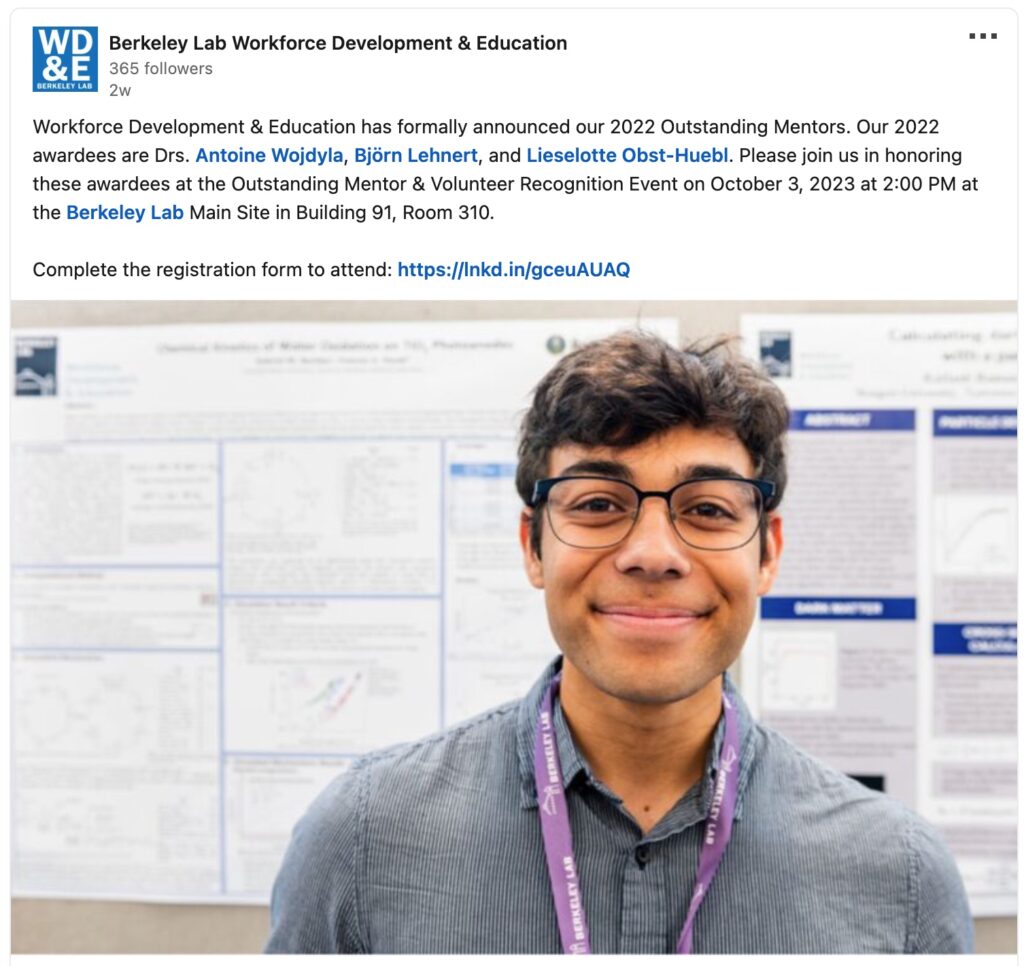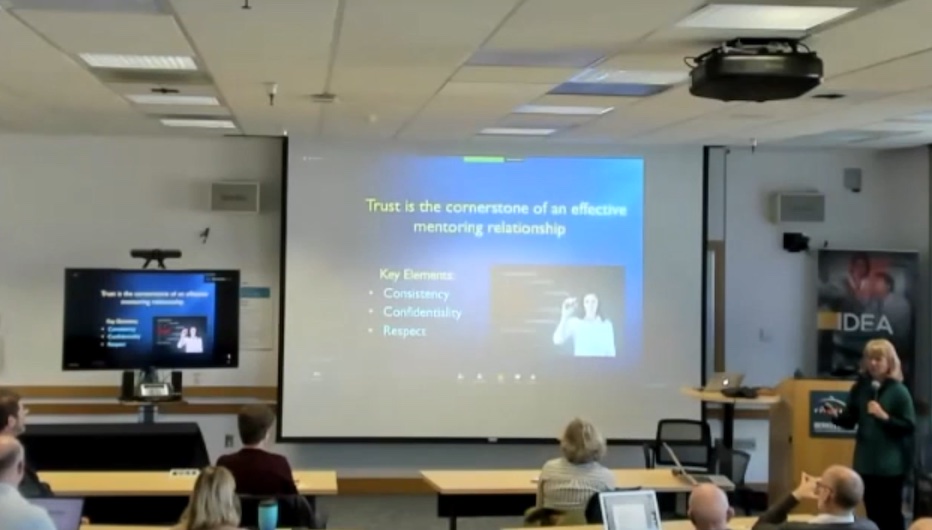This last month, I received two awards related to mentorship from Berkeley Lab. They both came as a surprise, since I consider myself more a student of mentorship than someone who has something to show for.
Berkeley Lab Outstanding Mentorship AwardDirector’s award for For building the critical foundations of a complex mentoring ecosystem I began to be interested in mentorship after I realized that mentorship plays a large role in the success of young scientist, (1) having experience myself the difference between having no mentorship and having appropriate mentorship (I’ll be forever grateful to my mentor/colleague/supervisor Ken Goldberg), (2) having had tepid internship supervision experience due to the lack of guidance, (3) realizing that academia is ill-equipped to provide the resources necessary for success.While I was running Berkeley Lab Series X, I always asked the speakers (typically Nobel prize laureates, stellar scientists and directors of prominent research institutions) how they learned to manage a group, and they answer was generally: “on the spot, via trial and error”, what struck me as awfully wrong. If people don’t get the proper resources/training, many are likely to fail, and drag their own group down the abyss. In this post, I will try to share resources I gathered along the years, and what I learned about mentorship, and provide some resources I found useful. This is more descriptive of my experience than prescriptive, but I hope you find this useful.
I began to be interested in mentorship after I realized that mentorship plays a large role in the success of young scientist, (1) having experience myself the difference between having no mentorship and having appropriate mentorship (I’ll be forever grateful to my mentor/colleague/supervisor Ken Goldberg), (2) having had tepid internship supervision experience due to the lack of guidance, (3) realizing that academia is ill-equipped to provide the resources necessary for success.While I was running Berkeley Lab Series X, I always asked the speakers (typically Nobel prize laureates, stellar scientists and directors of prominent research institutions) how they learned to manage a group, and they answer was generally: “on the spot, via trial and error”, what struck me as awfully wrong. If people don’t get the proper resources/training, many are likely to fail, and drag their own group down the abyss. In this post, I will try to share resources I gathered along the years, and what I learned about mentorship, and provide some resources I found useful. This is more descriptive of my experience than prescriptive, but I hope you find this useful.
Distinction between Mentor and Supervisor
No unsolicited advice
A great mistake mentors tend to make, give their seniority over mentees, is to provide unsolicited advice. Those advice are often well-intentioned, and a reflection of one has learned over the year, but the mentor should be aware that these advice may not apply to the situation of the mentee, and can easily come out as pontificating (I am very guilty of this.) Those advice tend to be too general, and the mentee may not have the same experience as you did, and it’s generally experience that teaches you the right thing to do.
An expert is a person who has found out by his own painful experience all the mistakes that one can make in a very narrow field. – Niels Bohr
Instead, you should wait for the mentee to ask for specific advice, and come up with your recommendations. And in general, the mentor should let the mentee request the meeting and set the agenda.
Reflexive listening
When you are mentoring someone, it is important to realize than a large fraction of mentoring is just listening. Sometimes proving the space to speak and allow someone to form their own ideas is all they need – the act of speaking (out loud) is very powerful, and can be construed as an exercise in mindfulness.
To make that listening experience even more efficient, it is recommended to resort to reflexive listening, that is repeating and rephrasing what has been said, first to signal that it has been heard and interpreted properly, but also to induce a open conversation. A good mentoring session is not too dissimilar to a good therapy session.Open-ended questions
When asking questions to the mentee, make sure to phrase questions in a way that allows open answers (not just yes or no.) Close questions do not promote the conversation (you quickly run out of questions) and may sound as judgmental, as they generally embed many assumptions within them.
Be kind
This sounds obvious, but kindness is very important in mentorship. Some mentors may feel the urge to provide “tough love,” thinking it may harden them based on the notion that younger generations are too coddled, thereby passing on their own traumas. Compassion is important, since you don’t know what the mentee has gone through, particularly if they’re from a different socio-economic background as you.
When you are giving an advice, it is good to lead by example – such advice are more powerful, and showing that you have experience also provide the mentee an example on how to act upon the advice.
Interview your interns
One mistake I’ve made earlier in my careers was to accept interns that were brought on board by other colleagues, without getting a chance to interview them, and make sure their interests aligned with the team. A research internship can be a great opportunity, or an excruciating experience for someone who’s not inclined to deal with learning and uncertainty inherent with science.
It’s also a good occasion to make sure the intern you select can get access to an opportunity they may not have had otherwise because of their upbringing – so make sure not to pay too much attention to existing skills, but their desire to grow and do some great science. Interns with “grinta” are very fun to work with.An unmotivated intern will take the spot of another one who could have benefited more (mentoring takes time.)Create a research plan
When dealing with an intern, it is a good idea to draft out a research plan with them, delineating a few of the tasks they will do every week, and deliverables along the line. For an intern, the scope has to be limited in time, o they get a better sense of perspective on what they will work on. This forces you adhere to the SMART principle (Specific, Measurable, Attainable, Realistic, Timely), and allow you to revisit from time to time this research plan. Keep it mind this is more of a guideline than a strict agenda – things in research never go the way you expect, and their may be forks in the road arising at all times.
As part of the research plan, also make room for professional development objectives (e.g., attend group meetings, learn how to make a poster or write and article), so that you are prepared to provide guidance, and a personal development plan – things that may not directly be related to research, but may help them in their career.These last two items are also very useful when the research is not going they way it was expected to: they can at least fold back on these objectives, and still have a positive learning experience.In the early days of the mentorship, it is a good idea to have regular check-ins (15 min max), to make sure the mentee has space to ask questions and seek appropriate resources (they are more likely to be shy to ask for your time than taking too much of yours.)It’s ok not to know
When mentoring, it’s important to make sure the mentee is not afraid to ask mundane questions. More often than not, these question can be quite profound: if someone cannot explain them easily, it is likely than many other people in the team may not understand either. There’s a lot of pressure in research to look and sound smart, to the detriment of others.
Here’s a good occasion to lead by example: make sure to ask questions that are seemingly obvious in group meetings. You may know the answer, but not everyone do, and that will open the door for other to ask further questions.A champion
There is often a distinction made between a coach, a mentor and a champion. Those roles are not necessarily strict, and at times a mentor may want to help a mentee increase their exposure and thus their profiles – they will eventually become public intellectuals. Through my experience of writing biographies on wikipedia, I found that information on academics is very difficult to find and that championing a scientist can go a long way to make their research available to the wider public.Mentoring resources
I have learned all these thanks to people I have the chance to work with, and below are some resources I’ve drawn from.
(Note: these resources may be available only to Berkeley Lab employees; please reach out to me if you want to have access to them)The MESA program at Berkeley Lab
and the corresponding slides: https://drive.google.com/file/
Geri Richmond, who led the MESA program Before Times (2019):
Here’s the corresponding material: https://drive.google.com/
Workforce Development and Education at Berkeley Lab
In a previous post on the mentoring of interns, I collected some resources provided by Berkeley Lab WD&E, and Department of Energy WDTS, which I found very useful.
- Berkeley Lab WD&E Mentor Handbook (pdf)
- Virtual Remote Mentor Guide -DOE-SC-WDTS Programs- May 2020 (pdf)
